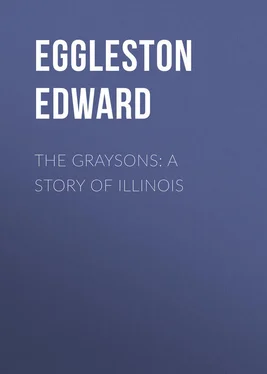Edward Eggleston - The Graysons - A Story of Illinois
Здесь есть возможность читать онлайн «Edward Eggleston - The Graysons - A Story of Illinois» — ознакомительный отрывок электронной книги совершенно бесплатно, а после прочтения отрывка купить полную версию. В некоторых случаях можно слушать аудио, скачать через торрент в формате fb2 и присутствует краткое содержание. Жанр: История, foreign_antique, foreign_prose, на английском языке. Описание произведения, (предисловие) а так же отзывы посетителей доступны на портале библиотеки ЛибКат.
- Название:The Graysons: A Story of Illinois
- Автор:
- Жанр:
- Год:неизвестен
- ISBN:нет данных
- Рейтинг книги:4 / 5. Голосов: 1
-
Избранное:Добавить в избранное
- Отзывы:
-
Ваша оценка:
- 80
- 1
- 2
- 3
- 4
- 5
The Graysons: A Story of Illinois: краткое содержание, описание и аннотация
Предлагаем к чтению аннотацию, описание, краткое содержание или предисловие (зависит от того, что написал сам автор книги «The Graysons: A Story of Illinois»). Если вы не нашли необходимую информацию о книге — напишите в комментариях, мы постараемся отыскать её.
The Graysons: A Story of Illinois — читать онлайн ознакомительный отрывок
Ниже представлен текст книги, разбитый по страницам. Система сохранения места последней прочитанной страницы, позволяет с удобством читать онлайн бесплатно книгу «The Graysons: A Story of Illinois», без необходимости каждый раз заново искать на чём Вы остановились. Поставьте закладку, и сможете в любой момент перейти на страницу, на которой закончили чтение.
Интервал:
Закладка:
Ike got home at half-past six, and Rachel had to spread for him a cold supper, chiefly of corn-bread and milk. He gave her the ribbon and the little package of square candy kisses from Lockwood. Rachel sat down at the table opposite her hungry brother, and, after giving him a part of the sweets, she amused herself with unfolding the papers that inclosed each little square of candy and reading the couplets of honeyed doggerel wrapped within.
"Did you hear anything of Tom?" Rachel asked.
"Yes."
"What was it?"
"Oh! I promised not to say anything about it."
"You needn't be afraid of making me jealous," said the sister, with a good-natured, half-defiant setting of her head on one side.
"Jealous? No, it's not anything like that. You ain't good at guessin', Sis; girls never air."
"Not even Ginnie Miller," said Rachel. She usually met Ike's hackneyed allusions to the inferiority of girls by some word about Ginnie. It was plain her brother was in a teasing mood, and that her baffled curiosity would not find satisfaction by coaxing. She knew well enough that Ike was not such a fool as to keep an interesting secret long enough for it to grow stale and unmarketable on his hands.
"Let it go, – I don't care," she said, as she got up and moved about the kitchen.
"You would, if you knew," said Ike.
"But I don't, and so there's an end of it"; and she began to hum a sentimental song of the languishing sort so much in vogue in that day. The melancholy refrain, which formed the greater part of this one, ran:
"Long, long ago, long ago."
It is one of the paradoxes of human nature that young women with all the world before them delight in singing retrospective melodies about an auld-lang-syne concerning which, in the very nature of the case, they cannot well know anything, but in regard to which they seem to entertain sentiments so distressful.
"It wasn't so very long ago, nuther," said Ike, whose dialect was always intensified when there were harvest hands on the place.
"What wasn't?" said Rachel, with her back to him.
"Why, Tom's scrape, of course."
"Was it a very bad one? Did he get took up?" Rachel's face was still averted, but Ike noted with pleasure that her voice showed a keen interest in his news.
"Oh, no, 't's not him that ought to be took up; it's Dave Sovine."
Rachel cleared her throat and waited a few seconds before speaking again.
"Did Dave hurt Tom much?" she asked, groping after the facts among the various conjectures that suggested themselves.
"Well, yes," said Ike, with a broad grin of delight at his sister's wide guessing; but by this time he was pretty well exhausted by the strain put upon his feeble secretiveness. "Yes, hurt him? I sh'd say so!" he went on. "Hurts like blazes to have a black-leg like Dave win all yer money an' yer knife, 'an yer hankercher, an' yer hat an' coat an' boots in the bargain. But you mus'n't say anything about it, Sis. It's a dead secret."
"Who told you?"
"Nobody," said Ike, feeling some compunction that he had gone so far. "I just heard it."
"Who'd you hear it from?"
"George Lockwood kind uh let 't out without 'xactly sayin' 't wuz Tom. But he didn't deny it wuz Tom."
Having thus relieved himself from the uncomfortable pressure of his secret, Ike got up and went out whistling, leaving Rachel to think the matter over. It was not the moral aspect of the question that presented itself to her. If Tom had beaten Sovine she would not have cared. It was Tom's cleverness as well as his buoyant spirit that had touched her, and now her hero had played the fool. She had the wariness of one who had known many lovers; her wit was not profound, and she saw rather than contrived the course most natural to one of her prudent and ease-loving temperament; she would hold Tom in check, and postpone the disagreeable necessity for final decision.
V
THE MITTEN
Next to Tom's foreboding about his uncle was the dread of the effect of his bad conduct on Rachel. On that rainy Saturday afternoon he thought much about the possibility of making shipwreck with Rachel; and this led him to remember with a suspicion, foreign to his temper, the part that Lockwood had taken in his disgrace. By degrees he transferred much of his indignation from Sovine to George Lockwood. He resolved to see Rachel on his way back to town, and if possible by a frank confession to her to forestall and break the force of any reports that might get abroad. The bold course was always the easiest to one of so much propulsiveness. He remembered that there was a "singin'," as it was called in the country, held every Sunday afternoon in the Timber Creek school-house, half-way between his mother's house and the Albaugh's. This weekly singing-school was attended by most of the young people of the neighborhood, and by Rachel Albaugh among the rest. Tom planned to stop, as though by chance, at the gathering and ride home with the ever adorable Rachel.
When Tom reached the school-house, Bryant, the peripatetic teacher of vocal music, was standing in front of his class and leading them by beating time with his rawhide riding-whip. Esteeming himself a leader in the musical world, he was not restricted to the methods used by musicians of greater renown. It is easy for ignorance to make innovation, – the America of a half century ago was seriously thinking of revising everything except the moral law. While Noah Webster in Connecticut was proposing single-handed to work over the English tongue so as to render it suitable to the wants of a self-complacent young nation, other reformers as far west as St. Louis were engaged in improving the world's system of musical notation. Of the new method Bryant was an ardent propagator; he made much of the fact that he was a musical new light, and taught the "square notes," a system in which the relative pitch was not only indicated by the position of the notes upon the clef, but also by their characteristic shapes. Any simpleton could here tell "do" from "me" at sight.
In the "Missouri Harmonist" the lines and spaces were decorated with quavers and semi-quavers whose heads were circles, squares, and triangles; Old Hundred becoming a solemn procession of one-legged and no-legged geometric figures. But Bryant understood his business too well to confine his Sunday classes of young people to Sunday tunes. When Tom, after tying his horse to the inner corner of a rail-fence, pushed back the school-house door, creaking on its wooden hinges, the four divisions of the class were chasing one another through a "round," the words of which ran:
"Now, Lawrence, take your bag,
And go right straight to mill,
And see, m – y b – o – y,
That not a bit you spill!"
This kind of music was naturally popular. Such a service relieves the tedium of a Sunday afternoon, and has something of the charm a dog finds in pursuing his own tail.
Some of the members of the class turned their heads and their vocal mouths towards the door when Tom came in, but in the midst of this jangle of voices singing different portions of the same air most of them had all they could do to keep their time by waving their heads or thumping their toes on the puncheon floor, while they alternately looked at their books and at Bryant, who thrashed away with his whip, his lips seeming to say, though the words were inaudible in the general din:
"Up, down, right, left, up," as he perpetually made right angles in the air. Rachel was in the act of drawing the word "boy" to the full length of a long note with a hold after it, but she looked up long enough to recognize the new arrival; then she dropped her eyes to the book again and gave the most severe attention to Bryant and the square notes thereafter, not once looking at Tom to the end. From this unwonted absorption in her music, Tom inferred that Rachel had somehow heard of his misconduct and was offended. But her charms enchanted him more than ever now that they were receding from him, and with a characteristic resolution he determined not to give her up without a sharp endeavor to regain his lost ground.
Читать дальшеИнтервал:
Закладка:
Похожие книги на «The Graysons: A Story of Illinois»
Представляем Вашему вниманию похожие книги на «The Graysons: A Story of Illinois» списком для выбора. Мы отобрали схожую по названию и смыслу литературу в надежде предоставить читателям больше вариантов отыскать новые, интересные, ещё непрочитанные произведения.
Обсуждение, отзывы о книге «The Graysons: A Story of Illinois» и просто собственные мнения читателей. Оставьте ваши комментарии, напишите, что Вы думаете о произведении, его смысле или главных героях. Укажите что конкретно понравилось, а что нет, и почему Вы так считаете.












